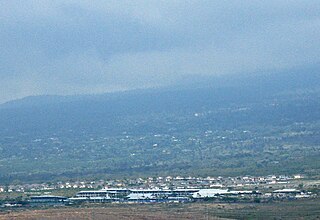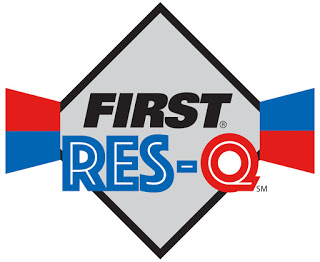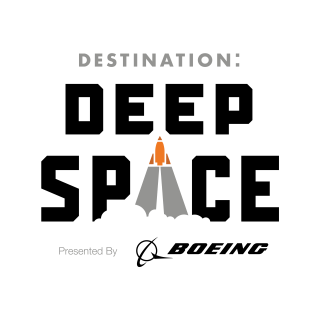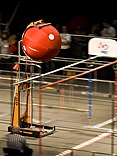
The Early College at Guilford (ECG) is a public magnet high school with approximately 200 students located in Greensboro, North Carolina. The school was started in 2002 as a partnership between Guilford College and Guilford County Schools as the first early college high school in North Carolina, allowing students to graduate with a high school diploma and up to two years of college credit from Guilford College.

FIRST Tech Challenge (FTC), formerly known as FIRST Vex Challenge, is a robotics competition for students in grades 7–12 to compete head to head, by designing, building, and programming a robot to compete in an alliance format against other teams. FIRST Tech Challenge is the one of the four major robotics programs organized by FIRST, which its other three programs include FIRST Lego League Explore, FIRST Lego League Challenge, and FIRST Robotics Competition.

In the 2007-2008 FIRST Tech Challenge robot competition, Quad Quandary is the first challenge theme replacing the former FIRST Vex Challenge, with similar general rules regarding the specifications of the robot and the game play. Unlike the previous challenge, Hangin'-A-Round, Quad Quandary makes use of small rings and movable goal posts.

The FIRST Championship is a four-day robotics championship held annually in April at which FIRST student robotics teams compete. For several years, the event was held at the Georgia Dome in Atlanta, Georgia, but moved to the Edward Jones Dome in St. Louis, Missouri in 2011, where it remained through 2017. In 2017, the Championship was split into two events, being additionally held at the George R. Brown Convention Center and Minute Maid Park in Houston, Texas. In 2018 and 2019, the Championship was held in Houston and Detroit, Michigan at the TCF Center and Ford Field. The event comprises four competitions; the FIRST Robotics Competition Championship, the FIRST Tech Challenge World Championship, the FIRST Lego League World Festival, and the FIRST Lego League Junior World Expo.

Kealakehe High School is a public high school located in Kailua, Hawaii County, Hawaii, United States. It has the largest geographic school attendance boundary in the state and covers a geographic district 40 miles (64 km) wide, encompassing the communities of Kailua-Kona, Hōlualoa, Waikōloa, and Puakō. The school motto is "Harmony and unity through dynamic education and community for everyone, every time."

Half-Pipe Hustle was the first official FIRST Vex Challenge (FVC) game, taking place in 2005–2006. In this challenge, robotics teams built robots from the Vex design kit to compete in competitions across the United States and in other nations, in matches consisting of a 45-second autonomous period, followed by a 2-minute driver control period in which the robots are controlled by team drivers using remote controls.
Livingston Robotics Club (LRC) is a robotics club in Livingston, New Jersey, that provides a community network to introduce Livingston area youth to robotics design and real-life science research, consistent with the vision of FIRST. LRC is known for its member teams as winners at state, national, and international FIRST LEGO League (FLL) competitions.

Hot Shot! is the robotics competition event in the 2009-2010 FIRST Tech Challenge. Two teams compete to score points by depositing whiffle balls into designated areas.
Get Over It! is the robotics competition event for the 2010-11 FIRST Tech Challenge. Two teams compete to score points by depositing colored batons in various types of goals. The name of the game refers to the many obstacles that traverse the middle of the field, which include a mountain, two bridges, and two ramps.

Logo Motion is the 2011 FIRST Robotics Competition game. Playing pieces are inner tubes shaped like the components of the FIRST logo. The primary objective of the game is to place them on racks to gain points. In the endgame, robots deploy smaller robots ("minibots") to climb a tower. Minibots must be made from the FIRST Tech Challenge kit of parts. The game celebrates the 20th season of the FRC and is also meant to commemorate the artist Jack Kamen, who designed the original FIRST logo.

Bowled Over!, released on 10 September 2011, is the 2011–12 robotics competition for FIRST Tech Challenge. Two alliances compete to score racquetballs into alliance-colored scoring goals. The name refers to two bowling balls on the field used for scoring points.

Ring It Up!, released on 8 September 2012, was the 2012–2013 robotics competition for FIRST Tech Challenge. In the competition, two alliances, each consisting of two teams, competed to score plastic rings on a set of pegs aligned in a three-dimensional tic-tac-toe board. Ring It Up! is the eighth FTC challenge. More than 2400 teams competed worldwide, surpassing the number of competitors in the previous year's Bowled Over! challenge.

Ultimate Ascent was the 2013 FIRST Robotics Competition game. It is styled similarly to disc golf.

Block Party!, released on September 7, 2013, is the 2013–2014 robotics competition for FIRST Tech Challenge. In the competition, two alliances, each consisting of two teams, compete to score blocks in plastic crates atop alliance-colored pendulums. Block Party! is the ninth FTC challenge.

FIRST Res-Q, released on September 8, 2015, is the 2015–2016 robotics competition for FIRST Tech Challenge. In the competition, two alliances, each consisting of two teams, compete to climb a mountain and score debris in alliance specific goals. FIRST Res-Q is the eleventh FTC challenge game.
VEX Robotics is a robotics program for elementary through university students, and a subset of Innovation First International. The VEX Robotics competitions and programs are managed by the Robotics Education and Competition Foundation (RECF). In April 2018, VEX Robotics Competition was named the largest robotics competition in the world by Guinness World Records.

FIRST Steamworks, stylized as FIRST STEAMworks, was the FIRST Robotics Competition game for the 2017 season. As in past games, two alliances of three individual teams and their robots compete on a field to score "match" point to win the game and ranking points to advance to playoff rounds. The game has a steampunk theme and teams are required to shoot wiffle balls which represent fuel into a simulated boiler which transfers the generated steam into an airship in the middle of the field. Each alliance has one airship, which they pressurize with steam from the boiler and load with plastic gears from the field. At the end of the match, robots can climb and hang on team-supplied ropes attached to the airship for additional points.

FIRST Power Up, stylised as FIRST POWER UP, is the FIRST Robotics Competition game for the 2018 season. It involves two alliances of three teams each, with each team controlling a robot and performing specific tasks on a field to score points. The game has a retro 8-bit theme and teams are required to place milk crates, or "power cubes", on large balancing scales to tip the scale and gain ownership. Alliances can also trade power cubes for power ups, giving them a temporary advantage in a match. At the end of the match, robots can climb the tower attached to the centre balancing scale using a rung attached to the tower, giving them additional points.

Destination: Deep Space, stylized as DESTINATION: DEEP SPACE and officially known as Destination: Deep Space Presented By The Boeing Company, is the FIRST Robotics Competition game for the 2019 season. It involves two alliances of three teams each, with each team controlling a robot and performing specific tasks on a field to score points. The game centers around an outer space theme involving two alliances consisting of three teams each competing to place poly-carbonate hatch panels and orange rubber balls or "cargo" on rockets and cargo ships before returning to their HAB platform to climb at the end of the match.

Rapid React, stylized as RAPID REACT and officially known as Rapid React presented by The Boeing Company for sponsorship reasons, is the FIRST Robotics Competition (FRC) game for the 2022 season. The game is themed around transportation as part of the FIRST-wide FIRST Forward theme for 2021-2022.


















